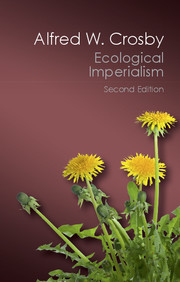Book contents
- Frontmatter
- Dedication
- Epigraph
- Contents
- List of Illustration
- Preface to the new edition
- Acknowledgments
- 1 Prologue
- 2 Pangaea revisited, the Neolithic reconsidered
- 3 The Norse and the Crusaders
- 4 The Fortunate Isles
- 5 Winds
- 6 Within reach, beyond grasp
- 7 Weeds
- 8 Animals
- 9 Ills
- 10 New Zealand
- 11 Explanations
- 12 Conclusion
- Appendix: What was the “smallpox” in New South Wales in 1789?
- Notes
- Index
- Frontmatter
- Dedication
- Epigraph
- Contents
- List of Illustration
- Preface to the new edition
- Acknowledgments
- 1 Prologue
- 2 Pangaea revisited, the Neolithic reconsidered
- 3 The Norse and the Crusaders
- 4 The Fortunate Isles
- 5 Winds
- 6 Within reach, beyond grasp
- 7 Weeds
- 8 Animals
- 9 Ills
- 10 New Zealand
- 11 Explanations
- 12 Conclusion
- Appendix: What was the “smallpox” in New South Wales in 1789?
- Notes
- Index
Summary
The colony of a civilized nation which takes possession, either of waste country, or of one so thinly inhabited, that the natives easily give place to the new settlers, advances more rapidly to wealth and greatness than any other human society.
–Adam Smith, An Inquiry into the Nature and Causes of the Wealth of Nations (1776)Old world germs were entities having size, weight, and mass, just like Sweet Betsy, her Ike, and their animals; germs required transportation across the oceans, which the marinheiros unintentionally supplied. Once ashore and lodged in the bodies of new victims in new lands, their rate of reproduction (as often as every twenty minutes) enabled them to outperform all larger immigrants in rapidity of increase and speed of geographical expansion. Pathogens are among the “weediest” of organisms. We must examine the colonial histories of Old World pathogens, because their success provides the most spectacular example of the power of the biogeographical realities that underlay the success of European imperialists overseas. It was their germs, not these imperialists themselves, for all their brutality and callousness, that were chiefly responsible for sweeping aside the indigenes and opening the Neo-Europes to demographic takeover.
Until recently, the chroniclers of human history had no knowledge of germs, and most believed epidemic disease to be supernatural in origin, something to be piously endured but rarely chronicled in detail. Therefore, the epidemiological history of the European colonies beyond the seams of Pangaea is like a jigsaw puzzle of 10,000 pieces, of which we have only half – enough to give us an idea of how large the original was and of its major features, but not enough for a neat reassembly. We bemoan the spottiness of our information; yet so great is its quantity and so neatly does it parallel accounts of the modern experience of what happens to isolated peoples when they are dragooned into the world community that we cannot doubt its general validity. Before we approach the history of Old World pathogens in the Americas and Australasia, let us take a look at a few recent examples of what science calls virgin soil epidemics (rapid spread of pathogens among people whom they have never infected before), in order to accustom ourselves to the possibilities of epidemiological catastrophe.
- Type
- Chapter
- Information
- Ecological ImperialismThe Biological Expansion of Europe, 900–1900, pp. 195 - 216Publisher: Cambridge University PressPrint publication year: 2015



